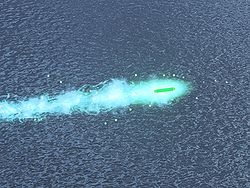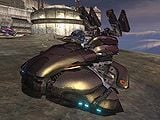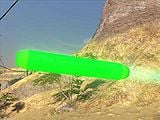Fuel rod: Difference between revisions
From Halopedia, the Halo wiki
AlertFiend (talk | contribs) No edit summary |
|||
| Line 56: | Line 56: | ||
**''[[Spartan Ops]]'' | **''[[Spartan Ops]]'' | ||
*''[[Halo: Spartan Assault]]'' | *''[[Halo: Spartan Assault]]'' | ||
*''[[Halo 2 Anniversary]]'' | *''[[Halo 2: Anniversary]]'' | ||
*''[[Halo 5: Guardians]]'' | *''[[Halo 5: Guardians]]'' | ||
*''[[Halo Online]]'' | *''[[Halo Online]]'' | ||
Revision as of 02:19, December 5, 2015
Fuel rod is a colloquial name for a form of explosive munitions used in several Covenant weapon systems.[1] Fuel rods are caseless, transparent projectiles,[1] containing green, radioactive material similar to the incendiary gel used in Mgalekgolo's assault cannons.[2] Once they strike the target, the radioactive materials contained in the projectile detonate.
Overview
At least two UNSC classifications of the Covenant's fuel rods are known. The Class-2 fuel rods are unguided, 38mm in diameter, and are used in the Fuel Rod Gun.[1] The fuel rod cannons mounted on the Anti-air Wraith and the Banshee use the heavier Class-3 fuel rods, which have a greater range and a capability to track heat signatures.[3]
Fuel rods are most often used in an anti-armor or anti-air role, but are also devastatingly effective against infantry.[1] They are essentially the Covenant equivalent to the UNSC's M19 surface-to-surface missiles.
Etymology
Though widely used among UNSC personnel, "fuel rod" is actually an informal term supposedly originating from common popular culture depictions of nuclear fuel rods.[2] Rumors surround fuel rods, with many UNSC Marines under the apparent belief that even carrying a weapon that uses them for ammunition can cause Boren's Syndrome.[4]
Gallery
A Type-33 fuel rod gun with a top-loaded clip of primed fuel rods.
List of appearances
Sources
- ^ a b c d Halo: The Essential Visual Guide, page 77
- ^ a b Bungie.net - Type-33 Light Anti-Armor Weapon
- ^ Halo: The Essential Visual Guide, page 9
- ^ Bungie.net - Type-51 Carbine



